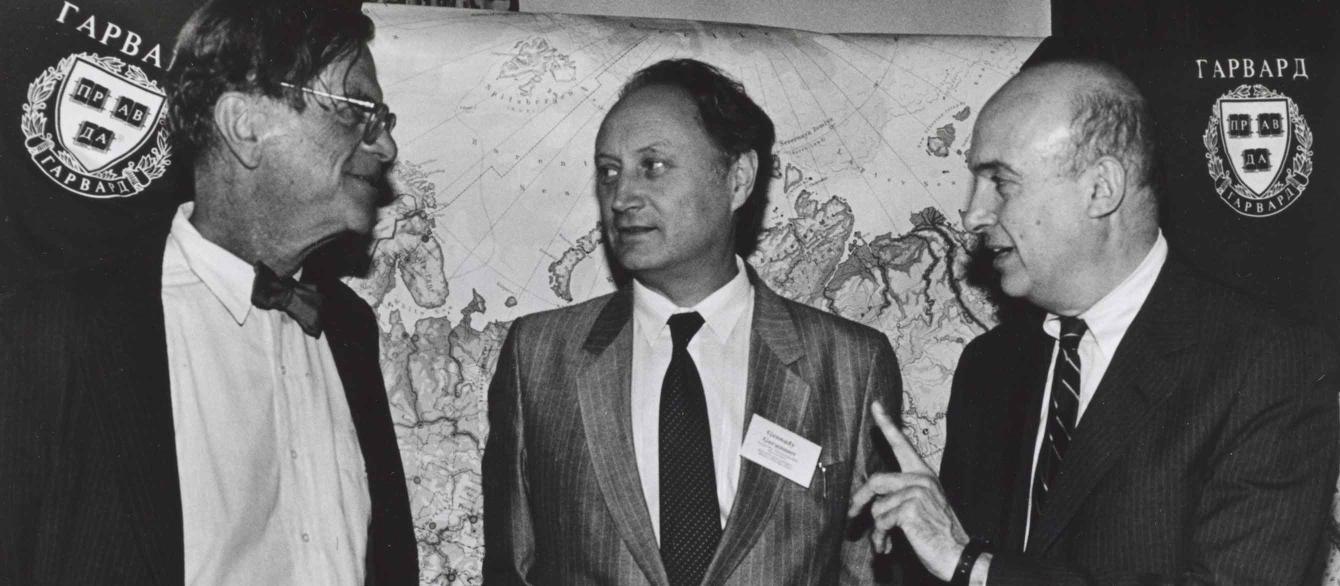Adam B. Ulam, Director of the Russian Research Center; Gennady Gerasimov, Official Spokesman, Soviet Ministry of Foreign Affairs; Marshall I. Goldman, Associate Director of the Russian Research Center; at the Center's 40th anniversary, 1987.
The interdisciplinary Russian Research Center (RRC) at Harvard University was founded in 1948 with the hopes that the social sciences could collectively address the pressing national need to understand the Cold War adversary. An initial grant from the Carnegie Corporation provided seed money to create a center in which large-scale research projects on the USSR could be designed and carried out by scholars and a reserve army of graduate student affiliates. The Center’s mission was to advance both pedagogical and policy objectives.
Soviet Studies saw impressive growth in the 1950s and 1960s as foundation and (after 1958) government funding increased, and Soviet-American scholarly exchanges began. However, as America and American campus life changed radically in the 1960s and 1970s, area-focused funding declined again and Russia experts turned to engage more fully in their respective disciplines. While the RRC retained its impressive convening power, scholars sought more and more to advance knowledge through disciplinary channels, working individually rather than on collective or interdisciplinary projects.
Gorbachev’s arrival on the scene in 1985 changed everything. Within four years, the Berlin Wall had fallen. Within six years, the Soviet Union had ceased to exist. Interest in the former Soviet Union and Eastern Europe soared among academics, students, and the public as a whole. Renamed the Kathryn W. and Shelby Cullom Davis Center upon receipt of a generous pledge from Kathryn Wasserman Davis, the institution became a nexus for lively discussions and research into once inaccessible archives and regions. No single discipline claimed a monopoly on understanding what had happened, and social scientists from across the university rediscovered the benefits of trading insights and ideas.
The modern Davis Center is strengthened by Harvard University’s academic firepower of leading scholars, exceptional graduate students, and motivated undergraduates, as well as over seventy years of history. We face challenges no less extraordinary than those of our predecessors—not the least of which is carving out a viable, innovative role for interdisciplinary research in an age of rapidly evolving technology. We pledge to actively pursue all meaningful opportunities for more fruitful and intense intellectual collaboration across countries, disciplines, and generations.
Directors of the Davis Center
Grzegorz Ekiert
Director, 2025-
Eve Blau
Director, 2022-2025
Rawi Abdelal
Director, 2015–2022
Terry D. Martin
Director, 2010–2015
Timothy J. Colton
Director, 1992–2010
Loren Graham
Acting Director, 1995–96
Marshall I. Goldman
Acting Director, 1984
Edward L. Keenan
Director, 1976–77
Adam Ulam
Director, 1973–76/1980–92
Richard Pipes
Director, 1970–73
Abram Bergson
Director, 1964–68
Acting Director, 1969-70
Director, 1977–80
Merle Fainsod
Director, 1959–64
William L. Langer
Director, 1954–58
Clyde Kluckhohn
Director, 1948–54




